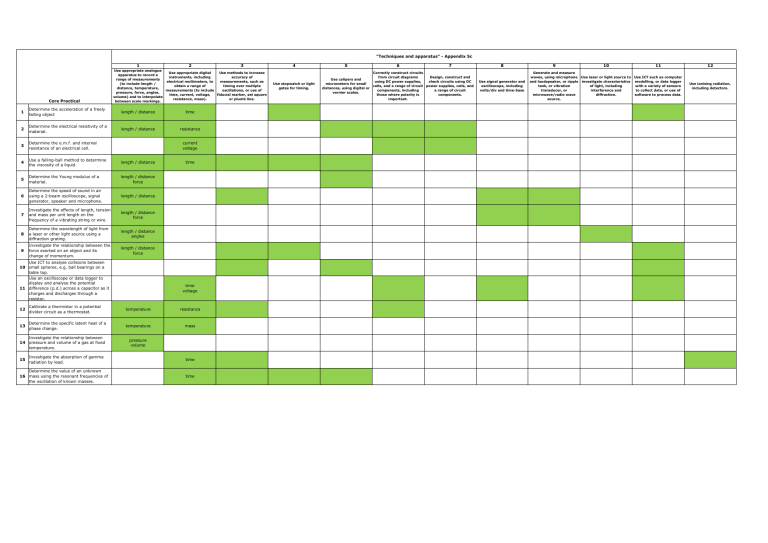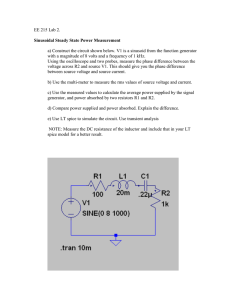
"Techniques and apparatus" - Appendix 5c 1 Core Practical 2 Use appropriate analogue Use methods to increase Use appropriate digital apparatus to record a accuracy of instruments, including range of measurements measurements, such as electrical multimeters, to (to include length / timing over multiple obtain a range of distance, temperature, oscillations, or use of measurements (to include pressure, force, angles, fiducial marker, set square time, current, voltage, volume) and to interpolate resistance, mass). or plumb line. between scale markings. 1 Determine the acceleration of a freely falling object length / distance time 2 Determine the electrical resistivity of a material. length / distance resistance 3 Determine the e.m.f. and internal resistance of an electrical cell. 4 Use a falling-ball method to determine the viscosity of a liquid. length / distance 5 Determine the Young modulus of a material. length / distance force 6 Determine the speed of sound in air using a 2-beam oscilloscope, signal generator, speaker and microphone. length / distance 7 Investigate the effects of length, tension and mass per unit length on the frequency of a vibrating string or wire. length / distance force 8 Determine the wavelength of light from a laser or other light source using a diffraction grating. length / distance angles 9 Investigate the relationship between the force exerted on an object and its change of momentum. length / distance force current voltage Use ICT to analyse collisions between 10 small spheres, e.g. ball bearings on a table top. Use an oscilloscope or data logger to display and analyse the potential 11 difference (p.d.) across a capacitor as it charges and discharges through a resistor. time time voltage 12 Calibrate a thermistor in a potential divider circuit as a thermostat. temperature resistance 13 Determine the specific latent heat of a phase change. temperature mass Investigate the relationship between 14 pressure and volume of a gas at fixed temperature. 15 Investigate the absorption of gamma radiation by lead. Determine the value of an unknown 16 mass using the resonant frequencies of the oscillation of known masses. 3 pressure volume time time 4 Use stopwatch or light gates for timing. 5 Use calipers and micrometers for small distances, using digital or vernier scales. 6 7 Correctly construct circuits Design, construct and from circuit diagrams check circuits using DC using DC power supplies, cells, and a range of circuit power supplies, cells, and a range of circuit components, including components. those where polarity is important. 8 Use signal generator and oscilloscope, including volts/div and time-base 9 10 11 Generate and measure waves, using microphone Use laser or light source to Use ICT such as computer and loudspeaker, or ripple investigate characteristics modelling, or data logger tank, or vibration with a variety of sensors of light, including transducer, or to collect data, or use of interference and microwave/radio wave software to process data. diffraction. source. 12 Use ionising radiation, including detectors.
